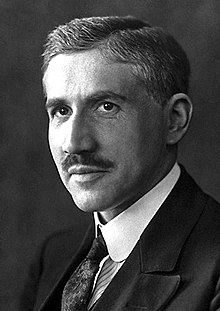Otto Fritz Meyerhof | |
|---|---|
 | |
| Born | 12 April 1884 |
| Died | 6 October 1951 (aged 67) Philadelphia, Pennsylvania, United States |
| Nationality | German |
| Alma mater | University of Strasbourg University of Heidelberg University of Berlin |
| Known for | Relationship between the consumption of oxygen and the metabolism of lactic acid in the muscle |
| Awards | Nobel Prize in Physiology or Medicine, 1922[1] Fellow of the Royal Society[2] |
| Scientific career | |
| Fields | Physics and Biochemistry |
| Institutions | University of Kiel |
Otto Fritz Meyerhof (German pronunciation: [ˈɔto ˈmaɪɐhoːf] ; 12 April 1884 – 6 October 1951) was a German physician and biochemist who won the 1922 Nobel Prize in Physiology and Medicine.[3][4]
- ^ Raju, T. N. (1998). "The Nobel chronicles. 1922: Archibald Vivian Hill (1886-1977), Otto Fritz Meyerhof (1884-1951)". Lancet. 352 (9137): 1396. doi:10.1016/S0140-6736(05)60805-7. PMID 9802314. S2CID 54412926.
- ^ Peters, R. A. (1954). "Otto Meyerhof. 1884-1951". Obituary Notices of Fellows of the Royal Society. 9 (1): 174–178. doi:10.1098/rsbm.1954.0013. JSTOR 769206. S2CID 161432856.
- ^ Anon (1951). "Obituary: Otto Fritz Meyerhof". The Lancet. 258 (6687): 790–792. doi:10.1016/S0140-6736(51)91682-0. PMID 14874513.
- ^ "The Nobel Prize in Physiology or Medicine 1922". Nobel Prize. Retrieved 11 January 2011.
Otto Fritz Meyerhof was born on April 12, 1884, in Hannover. He was the son of Felix Meyerhof, a merchant of that city and his wife Bettina May. Soon after his birth his family moved to Berlin, where he went to the Wilhelms Gymnasium (classical secondary school). Leaving school at the age of 14, he was attacked, at the age of 16, by kidney trouble and had to spend a long time in bed. During this period of enforced inactivity he was much influenced by his mother's constant companionship. He read much, wrote poetry, and went through a period of much artistic and mental development. After he had matriculated, he studied medicine at Freiburg, Berlin, Strasbourg, and Heidelberg.